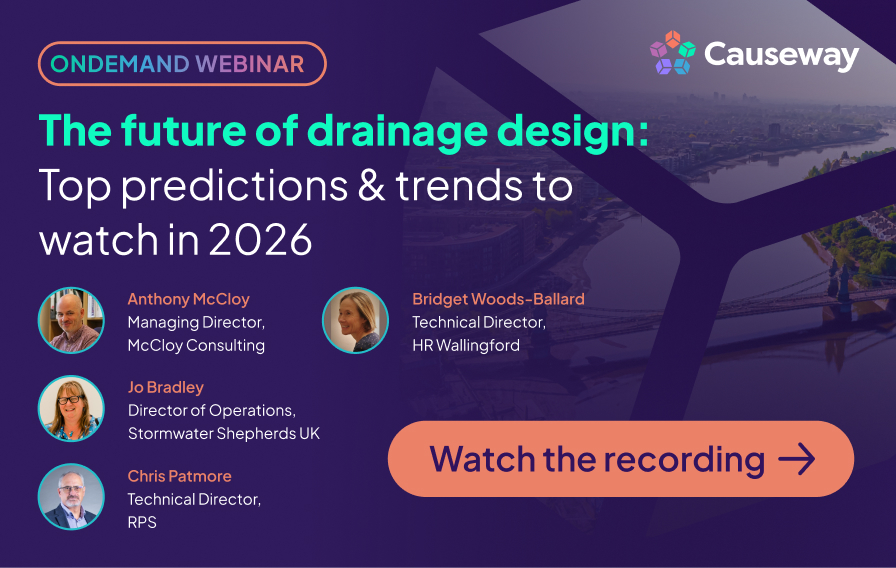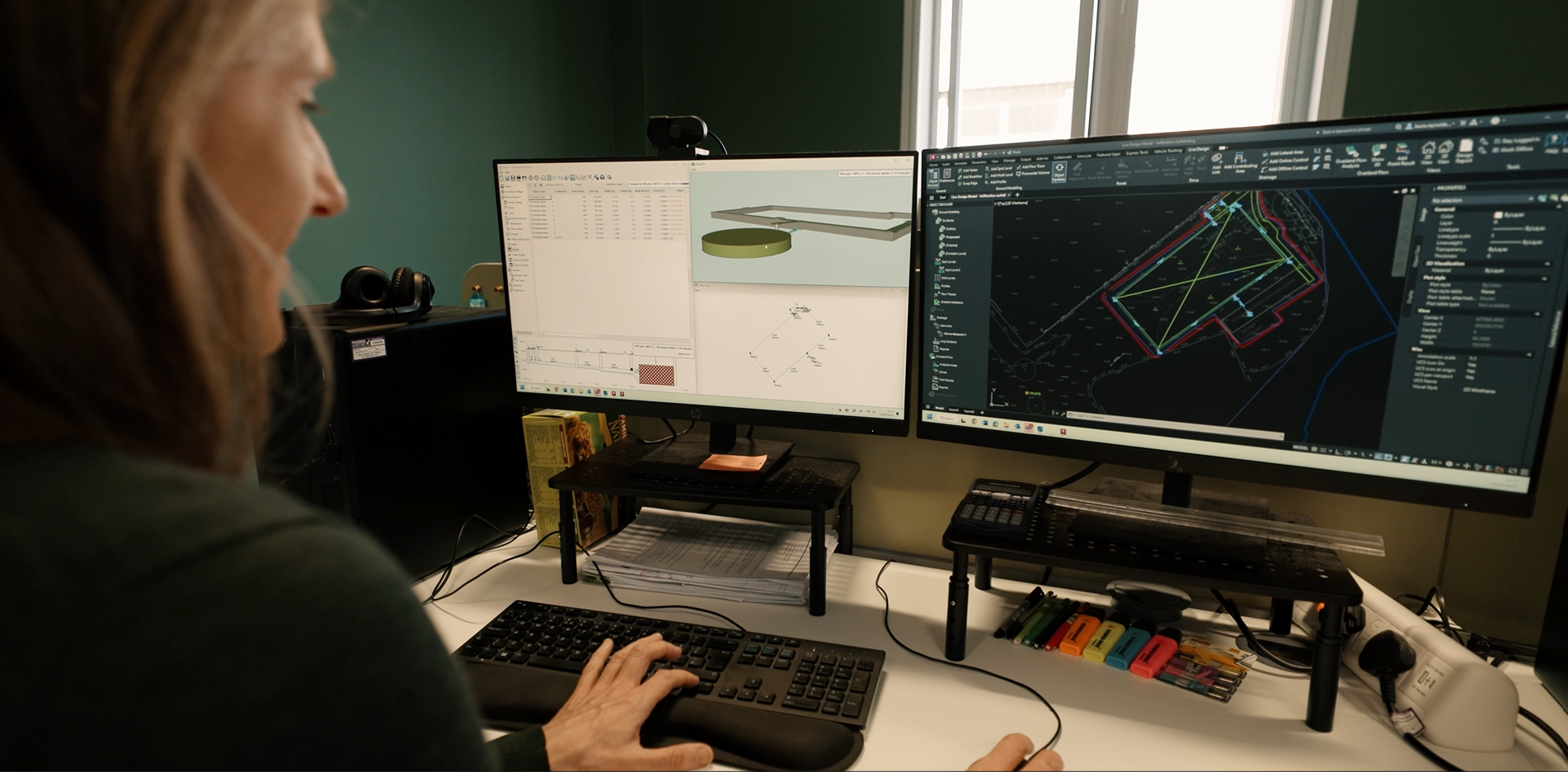In January, the Department for Food, the Environment and Rural Affairs (DEFRA) announced that it intends to make sustainable drainage systems (SuDS) mandatory on most new developments in England in 2024. This significant policy change aligns England with the approach taken in Wales since 2019. Here we look at what this means for businesses and hear from two consultancies experienced with SuDS standards in Wales.
Currently, SuDS is only required on developments of more than ten homes in England. The change in policy will be facilitated by implementing Schedule 3 of the Flood and Water Management Act 2010. This will require all developments of more than one home or with an area of more than 100 square meters to include SuDS.
Defra published their review of Schedule 3 in January 2023, with a commitment to hold public consultation coming later that year and implementation expected in 2024. The next step will be for DEFRA to launch a consultation on the details of implementation and the potential impact on developers.
The implementation of Sustainable Drainage Systems (SuDS) in England is a critical step towards effective flood management and environmental sustainability.
For more information on Schedule 3, visit the UK Government’s official page on flood risk management.
What are SuDs?
Where rain falls on impermeable surfaces created by urban development and greenfield construction, it quickly runs off to sewers, leading to flooding. With the number of households in England projected to increase by 1.6 million over the next 10 years, and the UK population expected to pass 70 million by 2037, many new homes will be built. Without a considered approach to drainage, there will be a significantly increased risk of flooding.
Sustainable Drainage Systems (SuDS) in England are designed to manage rainwater as close to where it falls as possible, replicating natural drainage processes to mitigate flood risk.
Discover how Causeway’s drainage design tools can support SuDS implementation in new developments.
SuDS control flood and pollution risks from urban run-off by managing rainwater, encouraging infiltration, attenuation, and passive treatment. SuDS also provide natural habitats, improve biodiversity, and create recreational areas.
A win for the environment
The change to mandatory SuDS in England has the potential to significantly benefit the environment and enhance the quality of life for residents in new developments. Richard Harman, Partner and Head of Engineering at Berrys, a property consultancy with clients in England and Wales, states:
“This is a positive move forward by DEFRA. The schemes we have delivered in Wales have provided clear environmental benefits through enhanced water quality, habitat provision, and amenity value, compared with more traditional ‘SuDS-lite’ designs previously relied upon.”
The adoption of Sustainable Drainage Systems (SuDS) in England marks a substantial step toward achieving environmental sustainability in urban planning.
Learn more about the environmental benefits of SuDS from the Environmental Protection Agency.
Andy Johnson, Associate at PJA agrees. He said:
“I think it’s a huge step forward in making SuDS, and multiple benefit SUDS in particular, mainstream and accepted by stakeholders.”
Implications for consultancies
The update to the Flood and Water Management Act 2010 will necessitate a shift in approach for businesses operating in England. Richard Harman highlights the main issues:
“There will be challenges for the industry as a whole in England. If the statutory standards are similar to those in Wales, this requires a more holistic approach to designing site layouts and planning for SuDS.”
Implementing Sustainable Drainage Systems (SuDS) in England will require consultancies to adopt a more integrated and holistic approach to site design and planning.
Andy Johnson notes the ambitious nature of the 2024 target: “The DEFRA report reads as though they have carefully considered what will happen, what has happened in Wales, and what the best approach is to ensure this Schedule is enacted well with few problems.”
Despite some concerns that SAB approval might add complexity, Richard and Andy believe the change will be manageable. Richard explains: “The current system is not working to its potential, and we have been advocating Schedule 3 for England to our clients for some time now.”
Find out how Curtins used Causeway Flow’s powerful SuDS features to successfully secure approvals
The benefits for developers
While SuDS has not been mandatory on all developments in England, many developers have already adopted this approach as a best practice. Andy Johnson explains: “We always work with the developer to introduce multiple benefit SuDS from the outset and guide the master plan to maximize the blue/green infrastructure as much as practical.”
Richard Harman notes the positive impact of SuDS in Wales: “The Wales model provides far more clarity in planning and designing SuDS for developments, ultimately resulting in better schemes with greater environmental benefits.”
How Causeway can help
At Causeway, we have always advocated for high-quality, sustainable designs, especially regarding drainage. Our Live Design software brings all infrastructure disciplines into one design environment, including fully integrated design tools with SuDS functionality – Causeway Flow and Causeway Overland Flow.
Causeway’s tools for Sustainable Drainage Systems (SuDS) in England provide comprehensive support for developing compliant and effective drainage solutions.
Causeway Flow is an end-to-end hydraulic modelling solution for analyzing and designing compliant and cost-effective storm and foul water drainage networks. Causeway Overland Flow allows efficient analysis of a site to show surface water flow and provide a detailed evaluation of flood levels.
Dr. Netsanet Mebrate, Subject Matter Expert on Flow and drainage design, said: “The announcement extending the requirement for SuDS to more developments in England is crucial for protecting both our natural and urban environments.”
Conclusion
The mandatory adoption of Sustainable Drainage Systems (SuDS) in England is a positive step towards environmental sustainability and effective flood management. This policy change will require businesses and consultancies to adopt new approaches to site design and drainage planning..
By leveraging advanced tools like Causeway Flow, businesses can ensure compliance with the new regulations and achieve superior project outcomes. Let us help you take your drainage design to the next level with Causeway Flow. Schedule your demo today!”



